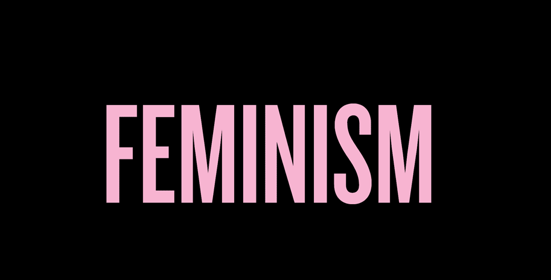By Lila Patinkin and Frani O’Toole
Feminism is not the “F-word.”
In fact, the “F-word”—a term splashed across headlines every time a celebrity announces their stance on feminism—underscores everything that is wrong about the way we talk about feminism. The “F-word” suggests that feminism is profane. It suggests that it ought to be censored, hushed, silenced. And to associate feminism with silence is to mistake all that it stands for.
The truth is, we need to be able to talk freely and comfortably about feminism and its core principles. We need to stop stigmatizing the discussion; whether for or against feminism, conversations are what will lead to progress. With this in mind, as a community, let’s talk about it.
Part of what seems to sour people to feminism is confusion over its definition. Many, understandably, don’t know to what degree the definition of feminism extends. Celebrities—whose stances on feminism have been the catalyst for many articles, including this one—have made statements that reflect wider misunderstandings about the meaning of the word and the concepts behind it. Shailene Woodley says she’s not a feminist because she “loves men.” Kelly Clarkson says she’s not a feminist because “that’s too strong […] I think when people hear feminist, it’s like ‘Get out of my way, I don’t need anyone.’ I love that I’m being taken care of and that I have a man that’s a leader.” Woodley’s and Clarkson’s views exemplify a discrepancy between perception and reality: what they see as the problem with feminism, others would call a problem with the way feminism has been misrepresented.
Another qualm with feminism is that the very act of “defining” something is putting that something into a box—a box that many, including junior Yulissa Arroyo, find stifling. Yulissa says that “I feel that when I start a discussion about gender and/or sexism people will call me a feminist, group me with their idea of feminism, and sort of discredit my ideas […] and I tend to have discussions dealing with intersectionality, so I’ll want to talk about race and gender or classism and sexism. But people will call me a feminist and not listen.” Indeed, “feminist” has become a put-down of sorts. In that, we see its usage being commandeered for purposes that contradict its fundamental principles of equality, empowerment, and respect.
Not just a box, “feminism” is also often dismissed as too much of a blanket term. On both sides of the spectrum, some criticize the term for failing to recognize the many nuanced interpretations of equality. Yulissa says that “I don’t know how I feel about saying I just want equality, but justice actually […] feminism seems to say that men and women should be equal. But I think we’re not at that point and that there should be justice for all.” And the truth is, everyone has a unique understanding of what equality means and how we should achieve it. Even so, while the differences in opinion highlight some of the drawbacks of the word “feminism,” they also reinforce the necessity of such a term: when dealing with such a dynamic and sensitive issue, we need to have language that will help us access and articulate our thoughts. Language that will help us identify our goals, organize them, and achieve them.
With that purpose in mind, here’s our definition of feminism: “Feminism is belief in the political, economic, and social equality of the sexes.“ This textbook definition, we think, encapsulates the basic ideals of feminism. And, believing in this definition, we, Lila and Frani, are feminists. We’re feminists because full-time female workers, on average, make 77 cents for every dollar earned by their male coworkers. We’re feminists because women are CEOs of only 4.8% of Fortune 500 companies. We’re feminists because women hold 18.9% of the seats in congress—a congress that regularly legislates matters of women’s health and wellness. We’re feminists because men and women alike are squeezed into fabricated ideas of “masculinity” and “femininity,” both of which are perpetuated by an unfair and biased media.
We’re feminists because only one out of the seven junior/senior prefect candidates this year was a woman.
And we believe that, by defining feminism as the “belief in political, economic, and social equality of the sexes,” feminism should be an accessible and universal ideal. While the belief does not demand that all of its supporters take direct and immediate action to combat gender inequality, it does ask supporters to maintain a certain consciousness about the issue. At Latin, where we are part of a generally accepting and empowering community, this means that it is important that we remain observant and active. So that when we witness sexism and gender inequality—which, if statistics are an accurate indication, we inevitably will—we’re better equipped to respond to it.
If you aren’t a feminist and your opinion isn’t represented here, please share it in the comments. As we’ve said, respect is the basis of progress, and we’d like to hear your opinion. Likewise, if you are a feminist and your ideas aren’t represented in this article, please comment below.
If you’re interested in learning more about feminism, we’ve included a few resources below:
Chimamanda Ngozi Adichie on why “everyone should be a feminist”:
https://www.youtube.com/watch?v=hg3umXU_qWc
Women in congress and business:
http://www.catalyst.org/knowledge/women-ceos-fortune-1000
http://www.cawp.rutgers.edu/fast_facts/levels_of_office/Congress-CurrentFacts.php
The pay gap (and confidence gap):
http://www.iwpr.org/initiatives/pay-equity-and-discrimination
http://www.theatlantic.com/features/archive/2014/04/the-confidence-gap/359815/
An inspiring note:
Additional resources on feminism (as recommended by Ms. Hennessy):
http://www.guerrillagirls.com/
Feminism is for Everybody by Bell Hooks
Female Chauvinist Pigs: Women and the Rise of Raunch Culture by Ariel Levy
In an effort to reverse the stigma surrounding feminism, the next article is a photo essay of Latin students who identify as feminists. Inspired by the whiteboards in the “I, Too, Am Harvard Movement,” this photo essay features a few of the many students who identify as feminists. Please continue to this link to view the essay:
http://blogs.latinschool.org/forum/2014/05/20/feminism-part-2-photo-essay/ Followed by that is an article featuring four full-length interviews with two faculty members and two students about the definition of feminism. Please continue to this link to read the interviews: http://blogs.latinschool.org/forum/2014/05/20/feminism-part-3-full-length-interviews/]]>





















































